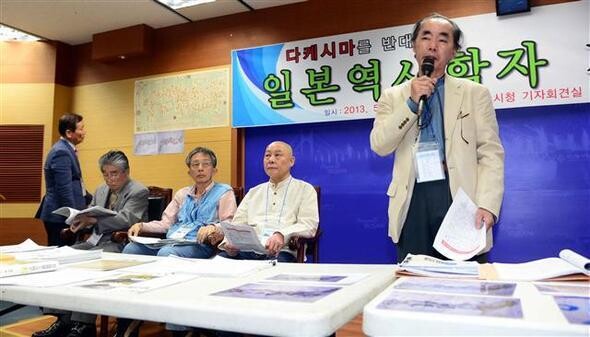hankyoreh
Links to other country sites 다른 나라 사이트 링크
Japanese historians say Dokdo is Korean territory

By Kim Kwang-soo, Busan correspondent
“Dokdo is Korean territory,” said Norio Kuboi, a professor at Momoyama Gakuin University (also known as St. Andrew’s University) on May 21. “The Japanese government needs to recognize the fact that it forcefully seized Dokdo during the Russo-Japanese War between 1904 and 1905.”
Norio had been invited to visit South Korea by the Busan People’s Dokdo School. He joined Yosihiro Kuroda, former professor at Osaka Shoin Women’s University, and Yuichi Sakamodo, former professor at Kyushu International University at a briefing held at the press room at Busan City Hall on May 21, where they urged the Japanese government, which has been moving to the right recently, to come to its senses. The three Japanese historians are planning to visit Dokdo on May 23.
“Before the outbreak of the Russo-Japanese War, Dokdo was without a doubt South Korean territory,” Norio said, presenting two photos. They are snapshots of maps that had been drawn by the Tokugawa shogunate in 1775 and 1778. The Tokugawa shogunate ruled Japan during the Edo period.
“On the map that was drawn in 1775, Dokdo and Ulleungdo are depicted as being Japanese territory,” said Norio. “But the shoguns pointed out that this map was incorrect. Dokdo and Ullengdo were not included on the map that was drawn after this in 1778. This shows that the Japanese shoguns during the Edo period believed that Dokdo belonged to Joseon.”
“Japan forcibly seized Dokdo so that it could win the Russo-Japanese War,” Kuboi said. “Japan justified its annexation on the grounds that no one was living there at the time. This was a product of the imperial mindset.”
Kuboi uses historical documents from Korea and Japan and old maps to raise awareness in Japan that Dokdo is not Japanese territory. Kuboi held an academic conference for citizens in March, and he formed a club in Osaka to change people’s views on Dokdo (called Takeshima in Japanese) with Kuroda and others on Apr. 22.
The group is planning to counter middle and high school textbooks published by the Japanese Ministry of Education that claim that South Korea is illegally occupying Dokdo by printing and distributing their own supplemental materials that explain that Dokdo does not belong to Japan.
In September, the professors will also organize a group to oppose “Takeshima Day,” a Feb. 22 holiday that was established by Shimane Prefecture.
“The Japanese Ministry of Education is doing such a poor job of teaching people that the children of Koreans living in Japan could become the victims of ijime [Japanese for bullying],” Kuboi said. “If the Japanese government comes to view Dokdo not as a territorial issue but as a historical issue, it will enable dialogue to take place between the governments of South Korea and Japan. I believe that if the two countries get together to talk, they can come to an agreement about Dokdo.”
When a reporter asked him which country Dokdo belongs to, he responded emphatically that it belongs to Korea.
Please direct questions or comments to [english@hani.co.kr]

Editorial・opinion
![[Editorial] Japan’s rewriting of history with Korea has gone too far [Editorial] Japan’s rewriting of history with Korea has gone too far](https://flexible.img.hani.co.kr/flexible/normal/500/300/imgdb/original/2024/0422/1717137715201877.jpg) [Editorial] Japan’s rewriting of history with Korea has gone too far
[Editorial] Japan’s rewriting of history with Korea has gone too far![[Column] The president’s questionable capacity for dialogue [Column] The president’s questionable capacity for dialogue](https://flexible.img.hani.co.kr/flexible/normal/500/300/imgdb/original/2024/0422/1517137717613239.jpg) [Column] The president’s questionable capacity for dialogue
[Column] The president’s questionable capacity for dialogue- [Column] Are chaebol firms just pizza pies for families to divvy up as they please?
- [Column] Has Korea, too, crossed the Rubicon on China?
- [Correspondent’s column] In Japan’s alliance with US, echoes of its past alliances with UK
- [Editorial] Does Yoon think the Korean public is wrong?
- [Editorial] As it bolsters its alliance with US, Japan must be accountable for past
- [Guest essay] Amending the Constitution is Yoon’s key to leaving office in public’s good graces
- [Editorial] 10 years on, lessons of Sewol tragedy must never be forgotten
- [Column] A death blow to Korea’s prosecutor politics
Most viewed articles
- 1Korean government’s compromise plan for medical reform swiftly rejected by doctors
- 2[Column] The president’s questionable capacity for dialogue
- 3[Editorial] Japan’s rewriting of history with Korea has gone too far
- 4Samsung barricades office as unionized workers strike for better conditions
- 5[Reporter’s notebook] Did playing favorites with US, Japan fail to earn Yoon a G7 summit invite?
- 6[Column] The clock is ticking for Korea’s first lady
- 7Korea protests Japanese PM’s offering at war-linked Yasukuni Shrine
- 8All eyes on Xiaomi after it pulls off EV that Apple couldn’t
- 9[Column] Are chaebol firms just pizza pies for families to divvy up as they please?
- 10What Israel’s ‘warning shot’ response to Iran means for Middle East tensions